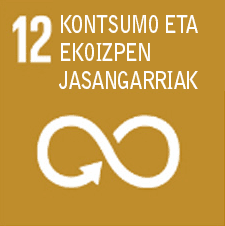THE NEW ORGANIC PLASTIC
- Taldearen izena
- THE NEW ORGANIC PLASTIC
- Taldekideak
-
- Aroa Castro .
- Amaya Mateo .
- Izaro Cossio .
- Irakaslea / tutorea
- Zorione Fundazuri Urkidi
- Ikastetxea
- Elorrio BHI
- Maila
- dbh4
- Herria
- Elorrio
- Probintzia
- Bizkaia
- Hizkuntza
- Ingelesa
- Lanaren eremua
-
- Fisika / Kimika
- Proiektu mota
- Ikerketa proiektua
- Proiektuaren txostena
-
 Deskargatu
— 4079 KB
Deskargatu
— 4079 KB
Ikertzaileen balorazioak
Congratulations on the submitted project! The document is very well organized: hypothesis, summary, materials and methods, procedure, chronogram, results and conclusions, acknowledgements and bibliography. The graphic representations are of an excellent quality. It is well written and I enjoyed reading it.
I especially liked the motivation of the project. Plastics generate environmental problems and therefore research on bioplastics is timely and opens up new opportunities. This type of work contributes to the sustainable development goals, in particular to SDG 12: Responsible consumption and production. It is a fact that mass production and consumption of plastics are major contributors to pollution in the sea and on land, especially single-use packaging plastic.
If you were to continue with this project, I would recommend studying the cost of producing plastic out of potatoes. Sometimes even though the technology is ready, the production costs are too high for its market uptake. This means that research on how to produce organic plastic at affordable cost is particularly useful since the objective is that it substitutes plastics made from petrochemicals/oil.
Another direction for further research would be to consider the environmental and economic impact of organic plastic. First, fertilizers are used to grow crops (potatoes) and they are associated to water pollution. Therefore, the use of renewable materials such as potatoes to produce plastic may not be environmentally neutral. Second, the production of organic plastic requires electricity and electricity may come from non-renewable sources (gas, for example). Third, if the plastic industry were to demand potatoes, corn and other similar materials at a large scale, this would increase prices and threaten food security in developing countries (this happened with biofuels).
Finally, I would like to emphasize the relevance of this project. Plastic pollution is one of the major global environmental challenges and more research is needed to facilitate a transition toward a circular plastic economy.
Mari Paz Espinosa Alejos
Ekonomia eta Enpresa Fakultatea
Euskla Herriko Unibertsitatea (UPV/EHU)

 Deskargatu
Deskargatu
